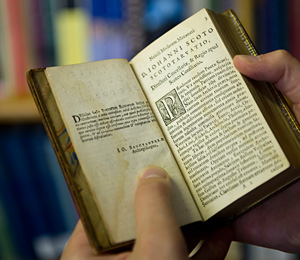Bridging the Continental divide: neo-Latin and its cultural role in Jacobean Scotland, as seen in the Delitiae Poetarum Scotorum (1637)
Welcome to the website for the University of Glasgow’s Bridging the Continental Divide project, which produced an electronic edition of a selection of the Delitiae Poetarum Scotorum huius aevi illustrium (DPS, Amsterdam, 1637), the largest anthology of Scottish Neo-Latin poetry ever produced. The project’s main aim, through this resource and related outputs, was to understand when and why Latin was used in Jacobean Scotland (c.1567-c.1625), and how it interacted with the Protestant culture that dominated early modern Scottish society.

Latin was Scotland's third language in the early modern period, alongside Scots and Gaelic. However, it has been described by Professor Robert Crawford as Scotland's literary 'lost continent' due to the lack of sustained academic research into Scoto-Latin texts, and translation thereof. This project, funded by the AHRC and based in the School of Humanities at the University of Glasgow between August 2012 and July 2015, used the opportunities afforded by digital humanities to energise a new sub-field of research into Scottish Latin culture. It did this by producing a critical edition of 11 of the 37 Scottish Neo-Latin poets in the DPS, which was edited by the Fife laird Sir John Scot of Scotstarvit and the Aberdonian poet Arthur Johnstone. The poets we selected were chosen for the fact that their works exist solely, or near-solely, within the confines of the DPS, and would otherwise have remained lost to history were it not for their recovery by the project. The final resource, comprising over 335 pages from the DPS and totalling over 350,000 words including all text and notes, is fully text-searchable. Thus, not only does it add 11 new voices to the corpus of early modern Scottish poetry; it also allows scholars to ask thematic, historical and genre questions of a substantial corpus of Scottish Neo-Latin material that would otherwise be impossible in a ‘static’ textual edition. The resource is supported by over 20 research articles published online by the project team and key collaborators during the research phase, which augment the range of published scholarly outputs resulting from the project. The website also includes a high-resolution digital scan of the entire 1,272-page DPS text, and is open ended so that the remainder of the text not translated now can be added by scholars in the future.
Digital humanities resources are by their nature provisional and experimental, and the electronic resource offered here is no different. Almost every poem on the site has been translated for the first time since their creation over four hundred years ago, and it is also the first time that any attempt has been made to reconstruct their meaning or their original context. We have taken a multi-disciplinary approach to do this, using traditional historical, classical and literary sources alongside digital solutions such as Classical word concordance software. This was a mammoth undertaking, and each poem features a full critical apparatus detailing all scriptural and philological references we could find, historical and social context, and biographical material on each poet. However, our interpretation and framing of each poem is necessarily provisional, based on the evidence we could find within the project timescale. What we offer here is not intended to be a definitive edition of each text, but a resource that will allow scholars, including those without a background in Latin translation, to engage with these otherwise forgotten texts, to investigate their meanings in further depth, and to build on – and challenge – our own initial assessments. It is thus intended that the resource will kickstart an iterative process that will result in the appearance of ever more ‘perfect’ and robust critical editions, and enrich the field of Scottish Neo-Latin studies. It is very much our hope that other scholars will use our texts as the foundation for articles, monographs and their own critical editions on both individual poets and themes deriving from the resource, and we very much encourage scholars to contact us to discuss this.
Why 'Bridging the Continental Divide'?
The project's title requires a word or two of explanation. Scottish Neo-Latinists saw themselves first and foremost as part of an international community of renaissance humanists fascinated by the Classical past. Despite James VI's accession to the English throne in 1603, and subsequent negotiations over closer Anglo-Scottish Union, most Scots featured in the DPS identified much more closely with the cultural and intellectual life of Continental Europe than they did with that of England. The project explored this aspect of Scottish cultural identity in depth.
The title also has a self-consciously modern meaning. While scholarship on the culture of Neo-Latin in England and in the majority of Continental European countries is well-developed, study of Scottish Neo-Latin prior to the project was largely confined to well-known 'political' writers such as George Buchanan, Andrew Melville, and David Hume of Godscroft. By providing a range of new case studies of less well-known poets, the project has begun the process of bridging the current divide between the level of knowledge of Neo-Latin culture in a Scottish context and that seen in countries such as France, England, Germany and Italy.
Quick links
- Browse the 11 poets translated by the project
- Search for specific terms or phrases (eg James VI, panegyric)
- Browse our collection of short research articles on Scottish Neo-Latin
- Learn more about the project aims and research questions
- Explore the project outputs
- Learn more about the project's key findings and significance
- Editorial methodology for the electronic resource
- Bibliography of Scottish Neo-Latin


